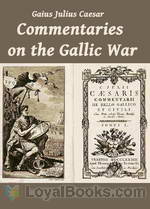|
Books Should Be Free Loyal Books Free Public Domain Audiobooks & eBook Downloads |
|
|
Books Should Be Free Loyal Books Free Public Domain Audiobooks & eBook Downloads |
|
Classics and Books from Antiquity |
|---|
|
Book type:
Sort by:
View by:
|
By: Flavius Josephus (37 - c.100) | |
|---|---|
 Minor Works of Josephus
Minor Works of Josephus
There are 3 parts to this collection.(1) Against Apion is a two-volume defense of Judaism as classical religion and philosophy, stressing its antiquity, as opposed to what Josephus claimed was the relatively more recent tradition of the Greeks. Some anti-Judean allegations ascribed by Josephus to the Greek writer Apion, and myths accredited to Manetho are also addressed.(2) Discourse To The Greeks Concerning Hades describes the author's views on the afterlife against the prevailing view of the "Greeks" (i... | |
By: Frederick Adam Wright (1869-1946) | |
|---|---|
 Greek Athletics
Greek Athletics
The history of Greek athletics as it pertains to the Olympics. Describes various activities such as boxing, wrestling, etc. and accounts from witnesses, the Iliad, etc. as they pertain to famous Greeks and events. He discusses Greek views of physical appearance and fitness as they pertain to the games and society and also how and why individual city-states chose to participate in the Olympics. | |
By: Frederick C. H. Wendel | |
|---|---|
 History of Egypt
History of Egypt
The history of Egypt from the earliest times to the conquest by Alexander the Great, covering the development of Egyptian civilization: science, religion, art, language and literature. This book is written for the interested layperson, requiring no prior knowledge of Egypt, and in approachable everyday language. | |
By: Gaius Julius Caesar | |
|---|---|
 Commentaries on the Gallic War
Commentaries on the Gallic War
Commentarii de Bello Gallico (English: Commentaries on the Gallic War) is Julius Caesar's firsthand account of the Gallic Wars, written as a third-person narrative. In it Caesar describes the battles and intrigues that took place in the nine years he spent fighting local armies in Gaul that opposed Roman domination.The work has been a mainstay in the teaching of Latin to schoolchildren, its simple, direct prose lending itself to that purpose. It begins with the frequently quoted phrase "Gallia est omnis divisa in partes tres", sometimes quoted as "Omnia Gallia in tres partes divisa est", meaning "All Gaul is divided into three parts". | |
By: Gaius Petronius Arbiter | |
|---|---|
 The Satyricon
The Satyricon
Satyricon (or Satyrica) is a Latin work of fiction in a mixture of prose and poetry. It is believed to have been written by Gaius Petronius, though the manuscript tradition identifies the author as a certain Titus Petronius. As with the Metamorphoses of Apuleius, classical scholars often describe it as a "Roman novel", without necessarily implying continuity with the modern literary form.The surviving portions of the text detail the misadventures of the narrator, Encolpius, and his lover, a handsome sixteen-year-old boy named Giton... | |
By: Gaius Sallustius Crispus (Sallust) (86-34 BC) | |
|---|---|
 The Catiline Conspiracy and the Jugurthine War
The Catiline Conspiracy and the Jugurthine War
The Catiline Conspiracy and The Jugurthine War are the two separate surviving works of the historian commonly known as “Sallust”. Nearly contemporary to the events he describes, he is supposed to have been a retired officer of Caesar’s army. “Catiline” contains the history of the memorable year 63. Sallust describes Catiline as the deliberate foe of law, order and morality (although party politics may have influenced his view). Still, Sallust does recount Catiline’s noble traits, including his courage in the final battle... | |
By: Geoffrey of Monmouth (1100-1155) | |
|---|---|
 History of the Kings of Britain
History of the Kings of Britain
More medieval romance than history, Geoffrey of Monmouth's Historia Regum Britanniae represents the oldest versions we have of many legends of Britain, populated by such characters as the Leir, Cymbeline, Uther and Arthur Pendragon and Cadwallader. This is Giles' 1848 revision of Thompson's 1718 edition. - Summary by SkyRider | |
By: George Frederick Maclear (1833-1902) | |
|---|---|
 Class-Book of Old Testament History
Class-Book of Old Testament History
This is classic book by scholar, educator, theologian and preacher George Frederick Maclear, headmaster of King's College School, London, and later warden of St. Augustine's Missionary College, Canterbury. Each short chapter is a nugget of events and persons of the Old Testament, giving a very accessible overview of history from the Earliest Times to those of Ezra and Nehemiah. | |
By: George William Cox (1827-1902) | |
|---|---|
 Athenian Empire
Athenian Empire
The British historian, George W. Cox writes that the "whole duration of the Athenian empire extends over little more than two generations." This confederation of Greek city states with Athens at its head was an attempt to present a unified front to the Persian Empire. But ultimately, the strife between democratic and oligarchic factions within each polis, combined with the tangle of alliances between the various city states, led to the ruinous and protracted Peloponnesian War. In this short work, Cox describes the battles on land and sea, and such personalities as the Athenian general, Nikias, his Spartan counterpart, Agis, and, above all, unprincipled, charismatic Alcibiades. | |
By: George Willis Botsford (1862-1917) | |
|---|---|
 Hellenic History
Hellenic History
"The purpose of this volume is to present in brief scope the evolution of Greek civilization a culture simple in its essential unity, although seemingly complex in its many and wide ramifications. In the conviction that the chief aim of history is to explain the present, the author has centered his attention on those phases of Greek life which have influenced to a marked degree the civilization of today." "In short this book represents an effort to combine political, economic, social and cultural history in one synthesis, centering attention on those factors which have contributed essentially to modern civilization... | |
By: Gildas | |
|---|---|
 On the Ruin of Britain
On the Ruin of Britain
Gildas was a well-informed and definitely opinionated 6th century commentator on the topic of the era of the Roman occupation of Britain beginning in AD 43, the subsequent desertion of Britain by the legions in AD 410, and then invasions by the Scots, Picts and Saxons. Gildas was critical of his fellow Britons, accusing them of unwarranted rebellion against the beneficial rule of Roman law, and of then pusillanimously calling upon Rome to help them defend against the invading Picts and Scots from the north... | |
By: Harry Rimmer (1890-1952) | |
|---|---|
 Dead Men Tell Tales
Dead Men Tell Tales
"Dead men tell no tales" was a common adage before the days of forensic science. In this book, the well-known evangelist and scientist uses Egyptology and archaeology to counter the argument in the investigation of Bible lore.. - Summary by Lynne Thompson | |
By: Homer | |
|---|---|
 The Odyssey
The Odyssey
A wandering king who's a war-hero doomed to roam the earth by a vengeful God, a plethora of fantastic experiences, a wife battling the invasion of suitors who wish to replace her missing husband, a son in search of his father - the Odyssey is a rich tapestry of incredible experiences and unforgettable characters. A must-read classic for anyone who wants to understand the fundamentals of Western mythology, it is a sequel to the Illiad which recounts the magnificent saga of the Trojan War. The Odyssey continues on, describing the trials and tribulations of the Greeks under the leadership of Odysseus... | |
 The Iliad
The Iliad
A divinely beautiful woman who becomes the cause of a terrible war in which the gods themselves take sides. Valor and villainy, sacrifices and betrayals, triumphs and tragedies play their part in this three thousand year old saga. The Iliad throws us right into the thick of battle. It opens when the Trojan War has already been raging for nine long years. An uneasy truce has been declared between the Trojans and the Greeks (Achaeans as they're called in The Iliad.) In the Greek camp, Agamemnon the King of Mycenae and Achilles the proud and valiant warrior of Phthia are locked in a fierce contest to claim the spoils of war... | |
By: John B. Bury (1861-1927) | |
|---|---|
 Students’ Roman Empire part 2, A History of the Roman Empire from Its Foundation to the Death of Marcus Aurelius (27 B.C.-180 A.D.)
Students’ Roman Empire part 2, A History of the Roman Empire from Its Foundation to the Death of Marcus Aurelius (27 B.C.-180 A.D.)
The writings of J. B. Bury, on subjects ranging from ancient Greece to the 19th-century papacy, are at once scholarly and accessible to the layman. This work covers the period from the beginning of the Roman Empire until Gibbon begins; from Augustus through Marcus Aurelius and the Antoinine Emporers. | |
By: John Howard Bertram Masterman (1867-1933) | |
|---|---|
 Dawn of Mediaeval Europe: 476-918
Dawn of Mediaeval Europe: 476-918
This volume by the British historian J.H.B. Masterman is a short survey of the first four centuries after the fall of Rome. The author writes of Theodoric, King of the Ostrogoths, who sought to impose order on a shattered Italy, of the rise of the Franks under Clovis, and of the resurgence of the Eastern Empire under Justinian and his general, Belisarius. At the close of the book, Charlemagne's descendants are wrangling for power among themselves, while, writes Masterman, from "the north came the Norsemen, ravaging and plundering along every river valley which their long ships could sail; from the south came the Saracens, the pirates of the Mediterranean, and ... | |
By: John Luther Long (1861-1927) | |
|---|---|
 Madame Butterfly
Madame Butterfly
Madame Butterfly is the story of the young Japanese girl Cho-Cho San, who marries a flighty American naval officer, and is thenceforth outcast from her relatives. Anxiously she awaits the return of her beloved husband, but when he finally anchors in the harbour, Cho-Cho San does not get the happy ending she was hoping for. This short story by John Luther Long has inspired Giacomo Puccini to write the opera of the same name. (Introduction by Availle) | |
By: John M. Corbett | |
|---|---|
 Aztec Ruins National Monument, New Mexico
Aztec Ruins National Monument, New Mexico
This U.S. National Park Service historical handbook from 1962 introduces the reader to the history, geography, and archaeology of the Aztec Ruins and surrounding area. It explores what has been learned about the early people who settled there and discusses what the ruins were like at the time of publication. - Summary by Verla Viera | |
By: John Milton (1608-1674) | |
|---|---|
 History of Britain
History of Britain
A reader of this history, encountering the frequent references to “my author,” meaning the current source, will be reminded of DON QUIXOTE and of THE MORTE D'ARTHUR, for Milton employs a style that might be called dissertational rather than novelistic; he carefully identifies his sources and often quotes from them. However, much of the scholarly documentation has been omitted from the reading—all except footnotes indicating the years—to avoid cumbersome interruptions. What will be obvious to a listener, though, is that Milton uses earlier chronicles with discretion... | |
By: Joseph Martin McCabe (1867-1955) | |
|---|---|
 Empresses of Rome
Empresses of Rome
The story of Imperial Rome has been told frequently and impressively in our literature, and few chapters in the long chronicle of man’s deeds and failures have a more dramatic quality. The fresh aspect of this familiar story which I propose to consider is the study of the women who moulded or marred the succeeding Emperors. Woman had her part in the making, as well as the unmaking, of Rome. Long before the commencement of our era, the thought and the power of the Roman woman went out into the larger... | |
By: Joseph Milner (1744-1797) | |
|---|---|
 History of the Church of Christ: Century III
History of the Church of Christ: Century III
It is certain, that from our Saviour's time to the present, there have ever been persons whose dispositions and lives have been formed by the rules of the New Testament; men who have been real, not merely nominal Christians, who believed the doctrines of the gospel, loved them because of their divine excellency, and suffered gladly the loss of all things, that they might win Christ, and be found in him. It is the history of these men which I propose to write. It is of no consequence with respect to my plan, nor of much importance I believe in its own nature, to what external church they belonged... | |
By: Knut Gjerset (1865-1936) | |
|---|---|
 History of the Norwegian People, Volume 1
History of the Norwegian People, Volume 1
A detailed and exhaustive history of the Norwegian People, written in two volumes. The author, Knut Gjerset, was born in Western Norway in 1865 and immigrated to Chippewa County, Minnesota, in the US with his parents in 1871 and his brother Oluf later got elected to public office there. He received a B.A. in Literature from the University of Minnesota, and also studied at John's Hopkins University from 1895-1896, and the University of Heidelberg, where he was awarded a PhD, from 1896-1898. This first... | |
By: Leigh North | |
|---|---|
 Predecessors of Cleopatra
Predecessors of Cleopatra
This book provides such information as was known at the onset of the 20th Century about Egyptian queens in antiquity. Much has been learned in the ensuing 100+ years so this book needs to be considered in the context of the time in which it was written. Queens are covered from Princess Nefert of the 3rd Dynasty through the famous Cleopatra. Leigh North is the pseudonym of Mrs. Elizabeth Stewart Phelps. | |
By: Longus | |
|---|---|
 The pastoral loves of Daphnis and Chloe
The pastoral loves of Daphnis and Chloe
Daphnis and Chloe is an Ancient Greek prose work, probably written during the second century CE, by Longus. It tells the story of two young people, Daphnis and Chloe, both abandoned at birth along with some identifying tokens. A goatherd named Lamon raises the boy Daphnis as his son, and a shepherd called Dryas finds Chloe, and also decides to raise her. They both grow up as neighbors herding the flocks in the island of Lesbos. They fall in love with each other, but have to go through many adventures and hardships, including abduction and pirate attacks, until they find their happy ending. | |
By: Lucian of Samosata | |
|---|---|
 Lucian's Dialogues Volume 1: The Dialogues of the Gods
Lucian's Dialogues Volume 1: The Dialogues of the Gods
The Dialogues of the Gods are 26 miniature dialogues mocking the Homeric conception of the Greek gods written in Attic Greek by Syrian author Lucian of Samosata. Almost 1900 years old, these dialogues still retain a lot of their original humor and wit. The cast list for dialogues with 3 or more readers is given below: Dialogue 8: Zeus: Owen CookHephæstus: KevinSStage directions: Foon Dialogue 9: Poseidon: ToddHWHermes: Owen CookStage directions: Foon Dialogue 13: Zeus: ToddHWAsklepius: FoonHerakles: KevinS Dialogue 20: Zeus: alanmapstoneHermes: Owen CookHera: FoonAthena: SoniaAphrodite: Sandra SchmitParis: Aaron WhiteStage directions: ToddHW Editor: Campbell Schelp | |
 Lucian's Dialogues Volume 4: Zeus the Tragedian
Lucian's Dialogues Volume 4: Zeus the Tragedian
Zeus, gloomy and in tragic distress, is implored by Hermes and Athena to divulge the cause of his melancholy condition; while Hera, true to her Homeric character, confidently attributes it to another earthly amour. The king of gods and men, thus adjured, announced the true reason of his anxiety--daring assaults upon the character of himself and the rest of the Olympian divinities, and, in fact, denial of their very existence by the skeptics. What would be the best course to pursue? Summary by FoonCast... | |
 Lucian's Dialogues Volume 2: The Dialogues of the Sea-Gods
Lucian's Dialogues Volume 2: The Dialogues of the Sea-Gods
The Dialogues of the Sea-Gods are 15 miniature dialogues mocking the Homeric conception of the Greek gods, originally written in Attic Greek by Syrian author Lucian of Samosata. Almost 1900 years old, these dialogues still retain a lot of their original humor and wit. - Summary by Foon Cast: Alpheius/Menelaus: ZoinkMeister Patrick Amphitrite/Panope: alanmapstone Cyclops: Nemo Delphines/Amymone: Leanne Yau Doris: Foon Enipeus: Rob Marland Galateia: Anita Sloma-Martinez Galene/Xanthus: Jeanne Viray Iphianassa: Pseudonymous Nerd Iris: Availle Notus: Stefan Von Blon Poseidon: Larry Wilson Protheus/Triton: Adam Bielka Thalassa: B L Newman Thetis: K... | |
 Lucian's Dialogues Volume 3: The Dialogues of the Dead
Lucian's Dialogues Volume 3: The Dialogues of the Dead
Dialogues of the Dead are 30 miniature dialogues mocking the Homeric conception of the Greek gods, originally written in Attic Greek by Syrian author Lucian of Samosata. Almost 1900 years old, these dialogues still retain a lot of their original humor and wit. - Summary by Foon The cast list for dialogues with 3 or more readers is given below: Dialogue 2: Kroesus: Lynette Caulkins Pluto: Alan Mapstone Midas: David Purdy Sardanapalus: TriciaG Menippus: Adrian Stephens Dialogue 3: Menippus:... | |
By: Lucius Annaeus Seneca | |
|---|---|
 Of Peace of Mind
Of Peace of Mind
How to maintain a tranquil mind amongst social upheaval and turmoil, addressed to Serenus. (Introduction by Jonathan Hockey) | |
 Of the Shortness of Life
Of the Shortness of Life
De Brevitate Vitae ("Of the Shortness of Life") is a moral essay written by Seneca the Younger, a Roman Stoic philosopher, to his friend Paulinus. The philosopher brings up many Stoic principles on the nature of time, namely that men waste much of it in meaningless pursuits. According to the essay, nature gives man enough time to do what is really important and the individual must allot it properly. In general, time can be best used in the study of philosophy, according to Seneca. | |
 Moral letters to Lucilius (Epistulae morales ad Lucilium)
Moral letters to Lucilius (Epistulae morales ad Lucilium)
Seneca the Younger’s letters to his friend, Lucilius Junior, appear to have been written with a broad audience in mind. These letters introduce major themes of Stoic philosophy and have been a source of inspiration and comfort for readers throughout the centuries. - Summary by jvanstan | |
By: Lucius Apuleius | |
|---|---|
 Metamorphosis or The Golden Ass
Metamorphosis or The Golden Ass
The Metamorphosis, also known as The Golden Ass, is one of the very few novels of the Ancient World that survived to our days; one of the two novels of Roman Literature that we can still read; and the only one preserved in its entirety (the other one being the extremely fragmentary Satyricon). The story of the Metamorphosis, the tale of a man turned into a donkey that goes through many adventures to become a man again, inspired many other similar ones later on. However, more than just the plot, the style of the Golden Ass also made it famous... | |